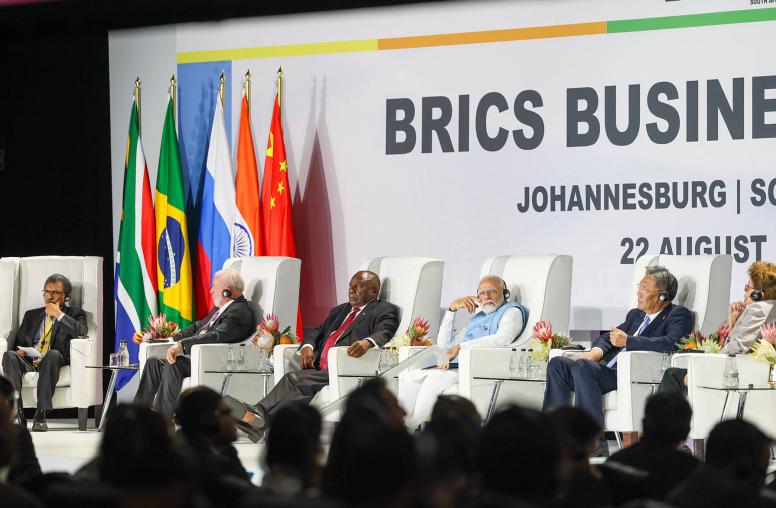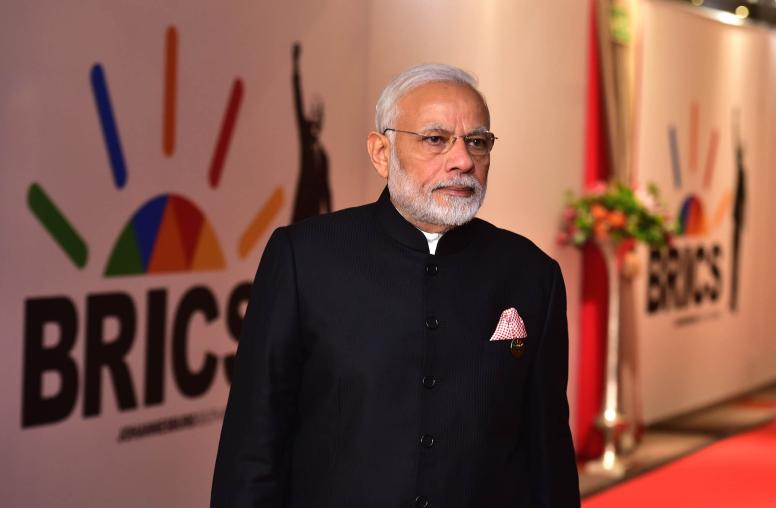Vikram Singh on Hong Kong and India-Pakistan
Massive unrest has hit Hong Kong, as citizens protest an extradition law they believe is favorable to China. Vikram Singh says protesters fear that Beijing is working to undermine Hong Kong’s longstanding judicial independence. Looking at India and Pakistan, Singh says that the chances for meaningful dialogue right now are small, as both countries focus on their own issues.
On Peace is a weekly podcast sponsored by USIP and Sirius XM POTUS Ch. 124. Each week, USIP experts tackle the latest foreign policy issues from around the world.
Transcript
Tim Farley: Let's take you overseas and, just for a moment, hear from an unidentified protester in Hong Kong. This is somebody yelling to the crowd this morning. We understand police using tear gas to try to keep the crowds and demonstrators at bay.
Protestor: I said, it boils down to a display of people power in Hong Kong, a display, in particular, of yelling, "people power."
Crowd: Yeah!
Tim Farley: It is one of the issues we want to get some clarity from our next guest. He can do it. Vikram J. Singh is the senior advisor to the Asia program at the United States Institute of Peace. The Twitter handle is @VJS_Policy. Dr. Singh, welcome. Thank you for being on the program today.
Vikram Singh: Thanks for having me.
Tim Farley: So, you can maybe simplify, so we can understand what is taking place here. Clearly this is a lot of people on the street and evidently they're very concerned about the possible passage of an extradition law. Explain what they're concerned about.
Vikram Singh: Yeah, by some estimates, one in every seven residents of Hong Kong was protesting in the last several days, which is pretty dramatic. The new extradition law would basically allow the Hong Kong courts, who are independent under the “one nation, two systems” system that China has in its control over Hong Kong. It would allow the Hong Kong courts to extradite people, basically anywhere, but including to mainland China. And, there's significant fear that the judicial independence that Hong Kong had long enjoyed would be severely compromised by this, allowing people to be sent to basically Communist Party-controlled courts on mainland China. That's a worry for Hong Kong residents. It's a worry for foreigners who could be arrested in Hong Kong but end up in a mainland Chinese court. It's something that the citizens of Hong Kong see as a real violation of their really valued independence.
Tim Farley: And, what is surprising, I guess in your mind, is that Carrie Lam, who is the chief executive in Hong Kong, has said there's no pressure from China. You find that hard to believe.
Vikram Singh: Yeah. I think it's interesting that she came out very strongly saying there's no pressure from China. It is true that this whole idea for this change in the law came about because of a case in Taiwan where Hong Kong had no extradition treaty and was unable to send back a suspect to Taiwan over a murder case. And so, her point is this was a Hong Kong idea to make it possible for Hong Kong to send fugitives back to face justice in the countries that were appropriate and that it wasn't designed by Beijing.
Vikram Singh: The problem is it has no, there's no mechanism to prevent extradition to mainland China. And, quite frankly, the Chinese, Beijing has reached into Hong Kong and abducted everyone from booksellers to billionaire businessmen that it wanted to have face justice back in mainland China. It's done it by, basically, sending agents in to kidnap people. So, it's a very real fear that this would suddenly give a legitimate mechanism to have people sent to Beijing and that Beijing would be happy to exert pressure.
Vikram Singh: In reality, Carrie Lam was Beijing's choice too to lead Hong Kong because the Hong Kong leaders are elected by a body that is basically beholden to Beijing.
Tim Farley: I don't want this to be the only issue we discuss, but I'm curious, what's the prospect for any success? I mean, it sounds like her support comes from other than just the people on the street. So, is it possible that they will get a reversible of government policy on this?
Vikram Singh: You know, there's a lot of opposition to this even in the legislature in Hong Kong, but it is moving forward, and it's being put up to a vote apparently middle of next week. And, Beijing supporters are the dominant force, so it would probably pass. I think the chances are, like we've seen in the past with protests in Hong Kong, that despite the outpouring of public concern, Hong Kong's independent status, which was supposed to be protected until 2047, is being eroded pretty rapidly, and I think the chances are it does go forward.
Tim Farley: Vikram Singh is with us, senior advisor to the Asia program of the United States Institute of Peace. Let us turn to the re-election or the victory of recent elections by Narendra Modi, who is the prime minister of India. The India-Pakistan-United States dynamic has always been fascinating in that Pakistan and India always look askance at the U.S. when the U.S. says something nice about the other. It always seems to work out that way. Is this going to change anything? Is this just a continuity of what is in place in India right now? How do you see this victory?
Vikram Singh: Well, I mean, I think one of the dominant trends over recent years has been that the United States had stopped sort of putting India and Pakistan together in one basket and has really focused on this big forward-looking relationship with India which is economic and defense cooperation and technology cooperation, and has been focused on Pakistan as a challenge in the war on terrorism, in bringing peace to Afghanistan. So, there's been this sort of separation. But, every now and then you get a big reminder of the seriousness of the tensions on the subcontinent, like we did in February and March when there was a terrorist attack from Pakistan into Indian-controlled Kashmir, and the Indians responded with air strikes, and the two actually got into air-to-air combat, something that hasn't been seen in a long, long time.
Vikram Singh: An Indian aircraft was down and a pilot captured, and people were worried that they were on the brink of war. So, there's been a lot of attention around will they find a way back to dialogue. The fact is, I think the Modi government is focused on reforms and looking forward and basically telling Pakistan, "You've got to stop supporting terrorism and then we can talk." And, the Pakistani government is really focused on its own domestic troubles. It's trying to get a six billion dollar bailout from the IMS because it's facing a debt and a fiscal crisis.
Vikram Singh: And, just last night, the former president was arrested on corruption charges, so now both a former president and a former prime minister are in jail in Pakistan. The government's presented a budget that is going to cut the budget in an effort to get the support from the IMS. So, I think both countries are focused mostly on their own issues, and chances are we won't see a serious effort for dialogue, at least not in the immediate term.
Tim Farley: To that point again, Prime Minister Modi returning to, if you will, internal affairs more than anything else. Is this seen as just a philosophical or is this just a practical thing? It's like, "Oh, we better take care of our knitting at home right now."
Vikram Singh: I think it's a practical thing and I don't think it's even a take care. It's a take an opportunity of India sort of rising on the world stage, India being a growing power. Its views of the Pakistan challenge is much less central to its future. And, he is concerned about poverty alleviation and getting energy out to all the Indians who still don't have electricity and water and sanitation and the sort of bread and butter issues that he's promised to deliver to the Indian people, which got him this stumping election result.
Vikram Singh: The mainline has been that he's going to stand up to Pakistan and be strong. So, on one hand he's in a very good position. If Modi wants to talk to Pakistan, he won't face any serious internal resistance. He'll be sort of trusted to lead that kind of engagement. But, on the other hand, it may not be something that's a top priority for him.
Tim Farley: Well, fascinating, as always, these developments. I appreciate the perspective. Thanks for being on the program today.
Vikram Singh: It was a real pleasure. Thanks.
Tim Farley: Dr. Singh is senior advisor to the Asia program at the United States Institute of Peace. An always fascinating dynamic, an important relationship, that is the United States with India and Pakistan separately and, of course, with the two of them often, it is as Vikram just said, had been put in the same basket but that we’re trying to separate them and whether or not that can be done. But, we're talking about a country with a billion people. Both are nuclear powers, and that in and of itself makes these relationships important. But, also, what's going on in Hong Kong, another fascinating development, and watching one out of every seven people, about a million people have been taking part in these protests. So, great that we could have him on for perspective. He's tweeting at @VJS_Policy.



